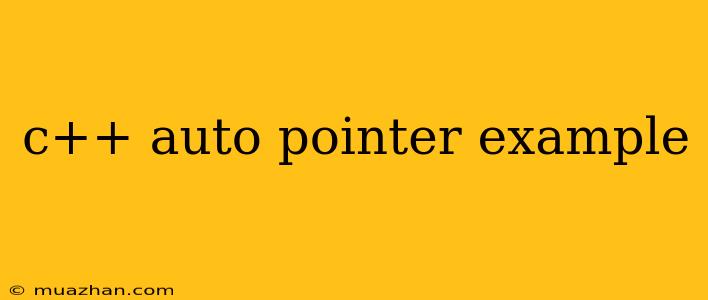C++ Auto Pointer Example
This article will demonstrate the use of auto_ptr in C++. auto_ptr is a smart pointer that automatically deletes the object it points to when it goes out of scope.
Why Use auto_ptr?
- Automatic Memory Management:
auto_ptreliminates the need for manual memory deallocation, reducing the risk of memory leaks. - Resource Management: It ensures the automatic release of resources associated with the object being pointed to.
- Improved Code Readability: By handling memory management automatically,
auto_ptrmakes code cleaner and easier to understand.
Example:
#include
#include
class MyClass {
public:
MyClass() { std::cout << "Constructor called\n"; }
~MyClass() { std::cout << "Destructor called\n"; }
};
int main() {
// Using auto_ptr
std::auto_ptr ptr(new MyClass);
// Accessing object using auto_ptr
std::cout << "Accessing object...\n";
(*ptr).~MyClass();
// delete ptr; // Not required, auto_ptr handles this
return 0;
}
Explanation:
- Include Header:
#include <memory>is included to access theauto_ptrclass. - Class Definition: We define a class
MyClasswith a constructor and destructor to track object creation and deletion. - Creating
auto_ptr:std::auto_ptr<MyClass> ptr(new MyClass)creates anauto_ptrnamedptrthat manages aMyClassobject. - Object Access:
(*ptr).~MyClass();allows accessing the object and calling its destructor. - Automatic Deletion: When
ptrgoes out of scope (end ofmainfunction), theauto_ptrdestructor automatically calls the destructor of theMyClassobject, releasing the memory.
Important Notes:
- Ownership Transfer:
auto_ptrimplements ownership transfer semantics. When you assign anauto_ptrto anotherauto_ptr, the originalauto_ptrloses ownership and becomes invalid. - Deprecated:
auto_ptris deprecated in C++11 and later. Modern C++ recommends usingunique_ptrorshared_ptrfor better ownership management and safety.
Alternatives:
unique_ptr: Provides exclusive ownership of the managed object.shared_ptr: Enables shared ownership of the managed object, allowing multiple pointers to point to the same object.
Conclusion:
While auto_ptr served as an early step towards automatic memory management, it's important to understand its limitations and use more robust alternatives like unique_ptr and shared_ptr in modern C++ code.
